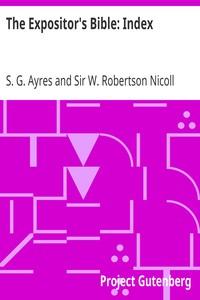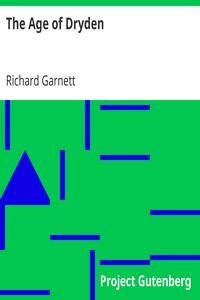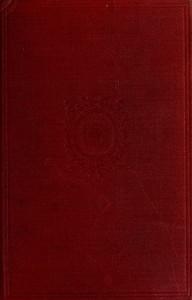|
|
Read this ebook for free! No credit card needed, absolutely nothing to pay.Words: 124351 in 223 pages
This is an ebook sharing website. You can read the uploaded ebooks for free here. No credit cards needed, nothing to pay. If you want to own a digital copy of the ebook, or want to read offline with your favorite ebook-reader, then you can choose to buy and download the ebook.

: The Expositor's Bible: Index by Ayres S G Samuel Gardiner Adeney Walter F Walter Frederic Author Of Introduction Etc Bennett W H William Henry Author Of Introduction Etc Nicoll W Robertson William Robertson Sir Editor - Bible Commentaries Indexes@FreeBooksWed 07 Jun, 2023 A friend of Richelieu and Mazarin, 10; A hapless ambassador, 11; A great chief of the Parisian police, 14. Bolingbroke in exile: the "Club de l'Entresol," 55; An active member, 57; "Un caf? d'honn?tes gens," 58; Cardinal Fleury and the Entresol, 59; The society suppressed, 60; A political aspirant, 61; Keen interest in the ecclesiastical quarrels, 62; D'Argenson, and Chauvelin's opinion of him, 65; Disadvantages: an embarrassed patron, 66; Political disappointments, 70; Relations with his wife, 71; D'Argenson and the fall of Chauvelin: a keen regret, 74; Appointed Ambassador to Portugal, 77; Six years of expectancy and intrigue, 78; Fleury and the Portuguese Embassy, 79; D'Argenson joins the Court opposition, 80; At feud with the Cardinal, 82; The weight of his indictment, 85; D'Argenson and Voltaire, 87; Their correspondence: literary quarrels, 88; "The best and most instructive work that I have read for twenty years," 89; The Prince Royal of Prussia, 91. November, 1744-January, 1747. D'Argenson in retirement: review of his Journal, 154; A revolution in politics, 156; Influence of England, 160; Diderot: Buffon: Voltaire: Rousseau, 162; An election to the Academy: a French Inquisition, 163; The revolution in thought, 165; D'Argenson's Journal: his power as a writer, 166; "Le style, c'est l'homme," 169; Private life: Paris and Segrez, 170; Conclusion, 171. "Consid?rations sur le gouvernement de la France," 173; Critical difficulties, 174; The "Plan" of 1737, 176; M. Martin's judgment of it, 177; The judgment of Voltaire, 179; Its prime distinction, 180; D'Argenson's views as to the value of the Monarchy: important change, 182; The "Plan" of 1755, 184; Abstract of the "Plan," 185; The scope and significance of d'Argenson's proposals, 199; D'Argenson and Turgot, 202; The scheme in the aspect of revolution, 204; A master-work of sagacity, 206. APPENDICES 213 NOTES 227 INDEX 255 THE MARQUIS D'ARGENSON. D'Argenson's Ancestry. There are occasions when the craft of the critic becomes especially delightful, and at the same time especially dangerous. Delightful, when the material in which he works is new and unessayed; dangerous, from the besetting temptation to be content with accredited methods, and to neglect that watchful regard to the texture of the clay, which alone can suggest the conditions of successful treatment. Of such delicate fabric is a man made, here and there. It is as if for a moment the common matter had been thrown aside wearily, as if Nature, when she wrought him, had been toying with an inspiration, sometimes happy, often unhappy. In dealing with such a man, the critic will proceed very patiently and tenderly. He will beware of presenting him, morally or otherwise, in the light of the prevailing prejudice; nor will he erect his own provincialities of opinion as a final measure of wisdom or worth. Rather will he let the man go his own way and tell his own tale, content if he may but follow and hear and understand, without sitting in the gate to judge him. That criticism, in the case of the Marquis d'Argenson, has not always been chastened to this wholesome deference, there will be occasion to notice at a later date. We may remark at once how necessary it was. D'Argenson was indeed no ordinary man. The character with which destiny had endowed him was but poorly adapted to the social medium in which it was to move; and to the great world where moral commonplace is law, he was a stranger. He dwelt, as such men do, in a little world of his own creating, peopled with his own pleasures and his own pains. His only critic was his conscience: himself was his sternest judge: and he knew no tribunal but the midnight silence, when the glow was dying on the hearth. He was an original, in short, and as an original he must be treated. Free books android app tbrJar TBR JAR Read Free books online gutenberg More posts by @FreeBooks
: A Catalogue of Books for the Young by E P Dutton Firm Griffith Farran Okeden Welsh - Children's books Catalogs@FreeBooksWed 07 Jun, 2023

: The Age of Dryden by Garnett Richard - English literature Early modern 1500-1700 History and criticism; Dryden John 1631-1700@FreeBooksWed 07 Jun, 2023
|
Terms of Use Stock Market News! © gutenberg.org.in2025 All Rights reserved.






